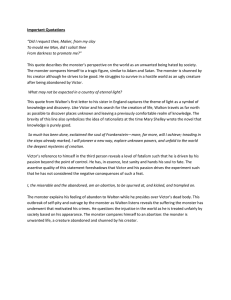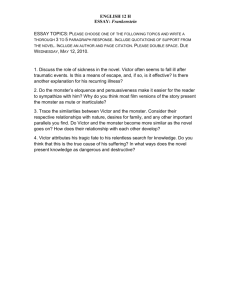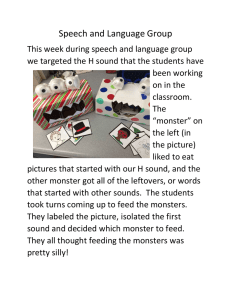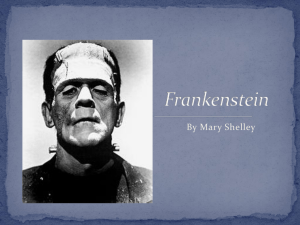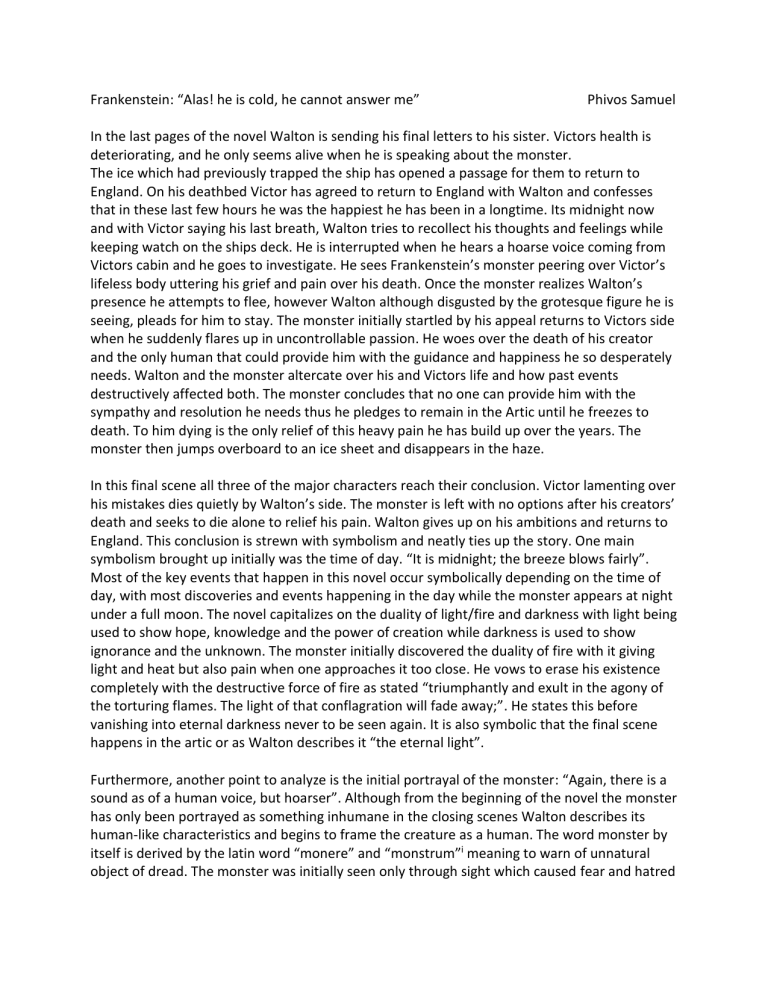
Frankenstein: “Alas! he is cold, he cannot answer me” Phivos Samuel In the last pages of the novel Walton is sending his final letters to his sister. Victors health is deteriorating, and he only seems alive when he is speaking about the monster. The ice which had previously trapped the ship has opened a passage for them to return to England. On his deathbed Victor has agreed to return to England with Walton and confesses that in these last few hours he was the happiest he has been in a longtime. Its midnight now and with Victor saying his last breath, Walton tries to recollect his thoughts and feelings while keeping watch on the ships deck. He is interrupted when he hears a hoarse voice coming from Victors cabin and he goes to investigate. He sees Frankenstein’s monster peering over Victor’s lifeless body uttering his grief and pain over his death. Once the monster realizes Walton’s presence he attempts to flee, however Walton although disgusted by the grotesque figure he is seeing, pleads for him to stay. The monster initially startled by his appeal returns to Victors side when he suddenly flares up in uncontrollable passion. He woes over the death of his creator and the only human that could provide him with the guidance and happiness he so desperately needs. Walton and the monster altercate over his and Victors life and how past events destructively affected both. The monster concludes that no one can provide him with the sympathy and resolution he needs thus he pledges to remain in the Artic until he freezes to death. To him dying is the only relief of this heavy pain he has build up over the years. The monster then jumps overboard to an ice sheet and disappears in the haze. In this final scene all three of the major characters reach their conclusion. Victor lamenting over his mistakes dies quietly by Walton’s side. The monster is left with no options after his creators’ death and seeks to die alone to relief his pain. Walton gives up on his ambitions and returns to England. This conclusion is strewn with symbolism and neatly ties up the story. One main symbolism brought up initially was the time of day. “It is midnight; the breeze blows fairly”. Most of the key events that happen in this novel occur symbolically depending on the time of day, with most discoveries and events happening in the day while the monster appears at night under a full moon. The novel capitalizes on the duality of light/fire and darkness with light being used to show hope, knowledge and the power of creation while darkness is used to show ignorance and the unknown. The monster initially discovered the duality of fire with it giving light and heat but also pain when one approaches it too close. He vows to erase his existence completely with the destructive force of fire as stated “triumphantly and exult in the agony of the torturing flames. The light of that conflagration will fade away;”. He states this before vanishing into eternal darkness never to be seen again. It is also symbolic that the final scene happens in the artic or as Walton describes it “the eternal light”. Furthermore, another point to analyze is the initial portrayal of the monster: “Again, there is a sound as of a human voice, but hoarser”. Although from the beginning of the novel the monster has only been portrayed as something inhumane in the closing scenes Walton describes its human-like characteristics and begins to frame the creature as a human. The word monster by itself is derived by the latin word “monere” and “monstrum”i meaning to warn of unnatural object of dread. The monster was initially seen only through sight which caused fear and hatred towards him, however through the course of the novel he has been discovered more and more through his voice (the most prominent encounter being with the The DeLacey family). Despite his appearance he has a highly sophisticated grasp of reason and language which is on par with Victor’s and Walton’s. When he is confronted by Walton, he appeals to his sense of pity through his constant rhetoric questions “ ‘And do you dream?’ said the daemon; ‘do you think that I was then dead to agony and remorse?”. In telling his own perspective of the events the monster seeks an understanding and compassionate affirmation for his actions. He wants to persuade Walton that he does have a heart which wants to do good, however his circumstances did not allow him to pursue those ambitions. The monster’s main problem is not that of his body or speech, is that he cannot be heard “Alas! he is cold, he cannot answer me.’ His voice seemed suffocated;”. Word count: 792 i Retrieved online from https://www.etymonline.com/word/monster

